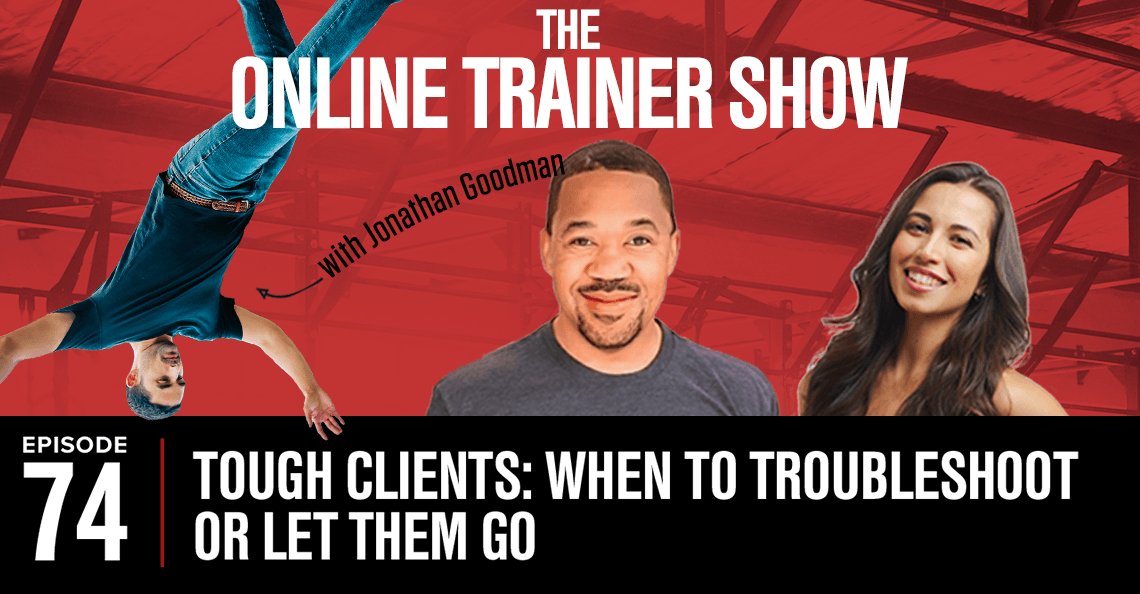Click here to listen to this episode on iTunes
Click here to listen to this episode on Spotify
Click here to listen to this episode on Stitcher
The Episode: Tough Clients — When to Troubleshoot or Let Them Go
Some clients are naturally easier to work with, while others may not be a good a fit. There comes a point where no amount of troubleshooting and communication can get people on the same page in a way that is beneficial to both parties, and this point is what we discuss in today's conversation. As a trainer or coach, you have an undeniable responsibility to set things out; expectations, boundaries, and important information. But even if this is done correctly, you and your client might find yourselves facing interpersonal challenges that cannot be overcome. It is in these situations that going separate ways may become advisable.
In This Episode
- The difficulty of 'firing' a client
- Conducting the conversations around these difficulties and letting a client go
- Taking responsibility for an unsatisfactory situation with a client
- Unforeseen circumstances and deal-breakers
- A healthy place for a coach in a person's self-care and support structure
- Signs that an arrangement has to change or end
- Doing what you can before looking to end work with someone
- A proactive approach to expectations and important information
“For me that was the hard line I was not willing to pass, so I fired her.” — Carolina Belmares
Anxiety Over Clients and Ending a Relationship
Chances are that you have or will experience a client stepping over a boundary of yours. This can take the form of refusing to do the necessary work or can be something more imposing that makes you feel unsafe or taken advantage of. These are legitimate issues that should be addressed, and taking note of the warning signs is step one.
How to Have the Necessary Conversations
It is vital that when issues arise, we as coaches facilitate healthy and progressive conversations. If the issues extend beyond our skill set, this is a good time to refer someone more appropriate, but the bottom line is you need to protect yourself and your mental health, while also considering the needs of the other person involved. There are different approaches to these troubled waters, and these will be determined by you, the client, and the nature of the issue.
The Responsibility of the Coach
Certain problems can arise from mistakes that you may have made, or areas that you overlooked. If things do not work out between a coach and a client, that is completely fine, but we need to remind ourselves of our role. Honesty and full disclosure from both sides can really aid the entire process and make any trouble more navigable. The more you are able to separate the facts from your feelings and maintain a clear picture, the easier it will be to find the right solution.
Already at $1,000/month online and want to scale?
Apply for OTA 2 here: www.thePTDC.com/OTA2
Sponsors
![]() This episode is brought to you by PT Distinction, the cutting-edge software designed purely for online coaches, to help them save time, expand their reach, and get back to doing what they do best—helping clients get amazing results.
This episode is brought to you by PT Distinction, the cutting-edge software designed purely for online coaches, to help them save time, expand their reach, and get back to doing what they do best—helping clients get amazing results.
As an added bonus for our listeners, get a full 60-DAY FREE TRIAL to test-drive PT Distinction. Start today at OnlineTrainer.com/ptd
 This episode is brought to you by the Online Trainer Academy Certification and Mentorship, the leading business development course for personal trainers, nutrition coaches, and gym owners to responsibly and successfully start, build, and grow your online fitness or nutrition coaching business.
This episode is brought to you by the Online Trainer Academy Certification and Mentorship, the leading business development course for personal trainers, nutrition coaches, and gym owners to responsibly and successfully start, build, and grow your online fitness or nutrition coaching business.
Start today for just $87/month at OnlineTrainer.com/Academy
Please Subscribe and Review
Enjoy this podcast? We're so glad.
Please subscribe wherever you listen to podcasts so you get the next episode delivered automatically as soon as it's posted.
Please leave a review to help others find the podcast as well.
All Episodes
Click here to see all published episodes






